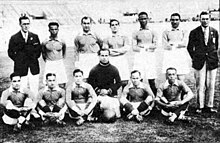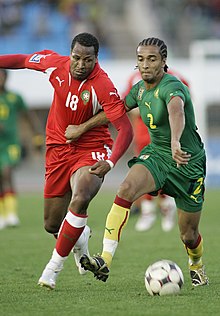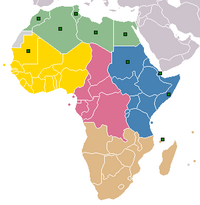Portal:Football in Africa
Introduction
Football is the most popular sport in Africa, alongside basketball. Indeed, football is probably the most popular sport in every African country, although rugby and cricket are also very popular in South Africa. The first football stadium to be built in Africa was the Alexandria Stadium in 1929.
The English Premier League is the most popular sports league in Africa. The most popular clubs in Africa are Arsenal, Chelsea and Manchester United. (Full article...)
This section may be unbalanced toward certain viewpoints. (October 2022) |

Selected article -
Egypt is Africa's oldest national football team and has won the African Cup a record seven times. Egypt has made three appearances in the World Cup and was the first-ever African and Middle Eastern team to make such an appearance. Their former goalkeeper Essam El Hadary also holds the record for the oldest player to have played at a World Cup.
Internationally, Egypt became a bronze medalist at the 2001 FIFA U-20 World Cup in Argentina.
Selected biography -
Born in Ajaccio, Khazri started his career with local side Jeunesse Sportive Ajaccio before moving to SC Bastia. He received his first call up to the senior squad for their match against Amiens SC on 20 February 2009. After five years in Bastia, Khazri signed a four-year contract with FC Girondins de Bordeaux in July 2014, where he made 64 appearances over two seasons before signing for Sunderland in January 2016.
After making his debut for the Tunisia national under-20 team in 2009, Khazri went on to represent France at under-21 level before switching allegiances again to represent Tunisia at the 2013 Africa Cup of Nations. Khazri also represented Tunisia at the 2015 and 2017 competitions.
Selected image -
 |
Nwankwo Kanu OON (born 1 August 1976) is a Nigerian former professional footballer who played as a forward. He was a member of the Nigeria national team, and played for Nigerian team Iwuanyanwu Nationale, Dutch side Ajax, Inter Milan of Italy, and English clubs Arsenal, West Bromwich Albion and Portsmouth.[9]
Subcategories
Related portals
More sports portals
WikiProjects
Related task forces and sub-projects
African football task force
WikiProject Africa • WikiProject Football
WikiProject Football task forces and sub-projects
 | |
| Wikipedia ads | file info – #250 |
Topics
Open tasks

- Expand stubs: Competitions in Africa • Organizations
- Expand club articles of teams from Africa.
- Expand biographies of Africans involved in football.
- Create: Requested articles • Most wanted football articles • Requested general football articles
- Add: Infoboxes • Images (General requests, Requested images of people)
- Review: articles currently under review
- Assess: Assessment requests • Assess an article
- Revert vandalism on this portal and on African football articles
- Assist in maintaining this portal and keeping its selected content up to date.
- WikiNews: Create and submit news stories about African football for Wikipedia's sister project WikiNews.
Associated Wikimedia
The following Wikimedia Foundation sister projects provide more on this subject:
-
Commons
Free media repository -
Wikibooks
Free textbooks and manuals -
Wikidata
Free knowledge base -
Wikinews
Free-content news -
Wikiquote
Collection of quotations -
Wikisource
Free-content library -
Wikiversity
Free learning tools -
Wiktionary
Dictionary and thesaurus
More portals
Sources

- ^ "The History Of Soccer In Africa". NPR.org. 2010-06-09. Retrieved 2016-03-31.
- ^ a b c Alegi, Peter (2010). African Soccerscapes. Ohio University Press. pp. 1–2. ISBN 9780896802780.
- ^ Frimpong, Enoch Darfah. "Ghana news: A world of superstition, frustration and disillusionment - Graphic Online". Retrieved 23 September 2017.
- ^ Lacey, Marc (8 August 2002). "Kangemi Journal; For Spellbinding Soccer, the Juju Man's on the Ball". The New York Times. NY Times. Retrieved 2016-03-31.
- ^ "World Cup Witchcraft: Africa Teams Turn to Magic for Aid". National Geographic. Archived from the original on July 10, 2006. Retrieved 2016-03-31.
- ^ Andy Mitten (September 2010). The Rough Guide to Cult Football. Rough Guides UK. ISBN 9781405387965. Retrieved 2016-04-02.
- ^ "African Nations Cup overshadowed by hocus pocus | Football". The Guardian. Retrieved 2016-04-09.
- ^ Kuper, Simon (2006). Soccer Against the Enemy: How the World's Most Popular Sport Starts and Stops Wars, Fuels Revolutions, and Keeps Dictators in Power. Nation Books. p. 123. ISBN 978-1-56025-878-0.
- ^ "Nwankwo Kanu". Eurosport.com.


























